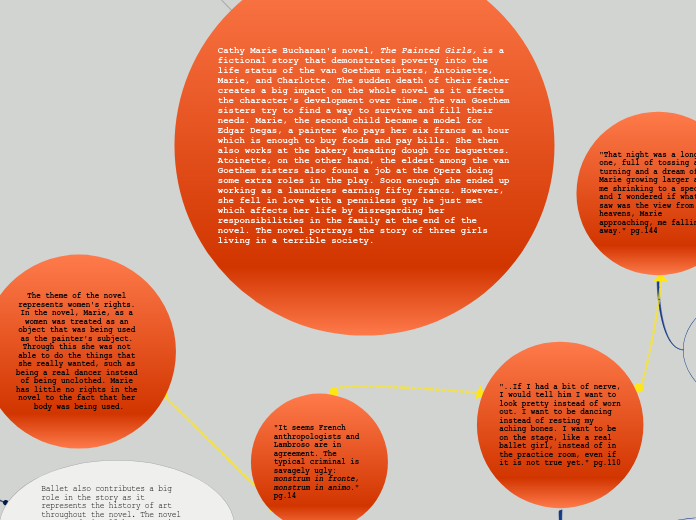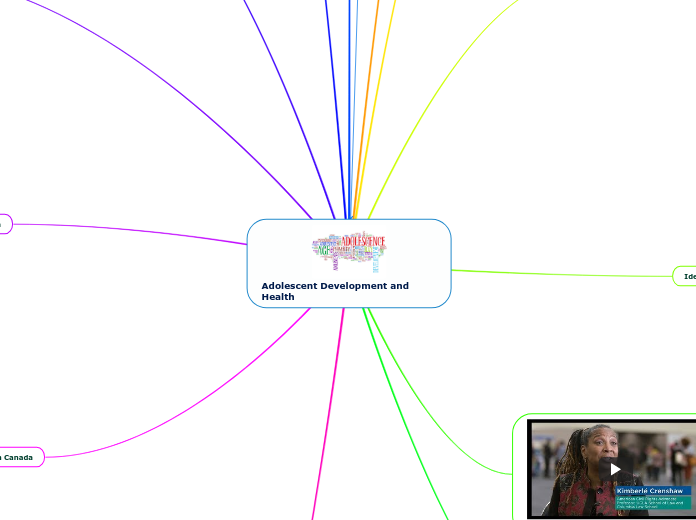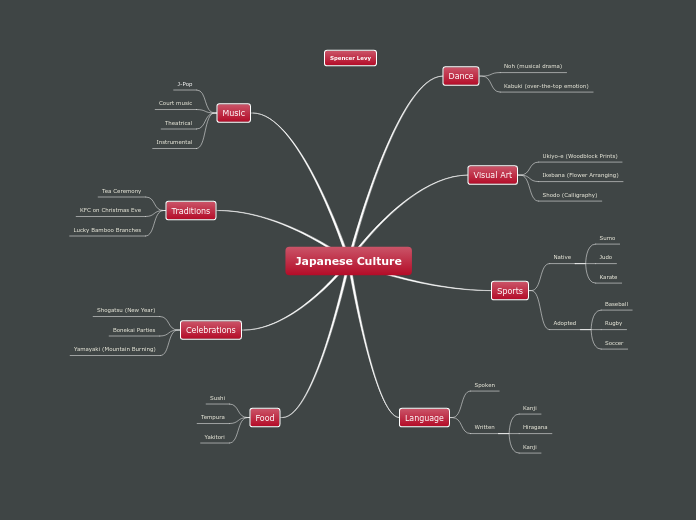'The story behind the story: Cathy Marie Buchanan on The Painted Girls' is an article about the author discussing her novel on how she came up with doing the story. Buchanan stated that, "As i watched the documentary, I could not help but think that young Marie must have been hopeful when degas aingled her out to model for him. How, then, I wondered, had the teenage girl felt when she saw the strange sculpture? How had she fared when the public peered into the sculpture's face and saw little more that depravity? It was the beginning of imagining a life of Marie." https://nationalpost.com/entertainment/books/the-story-behind-the-story-cathy-marie-buchanan-on-the-painted-girls
A book review from Angela M from goodreads.com states that, "I found this book to be sad and disturbing for most of the story. It definitely does not depict the prosperous time of peace and prosperity of the Belle Epoque. Rather, it depicts the seedier side of Paris, as the story of Antoinette and her sister Marie is told. There is no prosperity here for these sisters, their younger sister and their widowed mother, addicted to absinthe. These people are starving and can barely pay rent, and Marie will do what she has to in order to survive." https://www.goodreads.com/book/show/16138688-the-painted-girls
An article about Edgar Degas's biography and artworks. 'Degas was most celebrated as the painter of one subject: the ballet. Above all the subjects that he treated, whether the early history paintings, the scenes of life in the modern city - racecourses and cafes, shop girls, laundresses - or the portraits of family and friends that he continued to paint throughout his life, it is the dancer that is now associated with the name of Degas in the popular imagination.' https://www.nga.gov/content/dam/ngaweb/research/publications/pdfs/degas-the-dancers.pdf
And then what happened?
What is the ending of the story or event? Type it in.
"That night was a long one, full of tossing and turning and a dream of Marie growing larger and me shrinking to a speck, and I wondered if what I saw was the view from the heavens, Marie approaching, me falling away." pg.144
A solution is found for the problem or challenge.
This quotation from the novel uses imagery to demonstrate the life Marie between Antoinette through a dream. At the age of fourteen, Marie is slowly becoming successful as of earning enough money and becomes noticeable by other people. However, Antoinette becomes the opposite.
What was the solution to the problem? Type it in.
Ballet also contributes a big role in the story as it represents the history of art throughout the novel. The novel was set during 19th century in Paris where it was known as the capital of ballet. Ballet symbolizes the van Goethem sisters lives because they were discovered through ballet.
Who is the main character in the story? Type in his/her name.
Research Component
Resolution is the part of the story's plot where the main problem is resolved or worked out.
"..If I had a bit of nerve, I would tell him I want to look pretty instead of worn out. I want to be dancing instead of resting my aching bones. I want to be on the stage, like a real ballet girl, instead of in the practice room, even if it is not true yet." pg.110
This is the But moment in the story or event, when one or several issues arise, messing up the character's plans.
Buchanan uses a soliloquy for this quotation as a literary device to address the narrator's thoughts to the readers. This moment is very important in the novel because Marie refuses to show her vulnerability due to fear. Hence, Marie was still able to do lot of things that she was not comfortable with only because she was ordered to do so.
Marie was referring to Edgar Degas with this quotation on how she wishes that she was not afraid to lose six francs just to do what she really wanted to. The fact that Marie could not even obtain the simple things that she wanted was a hard situation because for Marie surviving is what only matters.
What is the conflict or problem that has occurred? Type it in.
"It seems French anthropologists and Lambroso are in agreement. The typical criminal is savagely ugly: monstrum in fronte, monstrum in animo." pg.14
This is the Wanted component in the story and it refers to what your character planned on doing in this story or event.
This quotation is important in the novel because it creates foreshadowing about the background of Emile Abadie, lover of Antionnete, relating to his crime at the middle of the novel.
This quotation is based from an article, Le Figaro during May 23, 1878 entitled 'Criminal Man'. The article explains about the facial characteristic of a criminal which is documented by the scientist during the time period.
What are the character's plans? Type them in.
The theme of the novel represents women's rights. In the novel, Marie, as a women was treated as an object that was being used as the painter's subject. Through this she was not able to do the things that she really wanted, such as being a real dancer instead of being unclothed. Marie has little no rights in the novel to the fact that her body was being used.
This is the Somebody in your story
It can be a person, an animal, a monster, a figure, an item, and it is the centerpiece of the entire story.
Cathy Marie Buchanan's novel, The Painted Girls, is a fictional story that demonstrates poverty into the life status of the van Goethem sisters, Antoinette, Marie, and Charlotte. The sudden death of their father creates a big impact on the whole novel as it affects the character's development over time. The van Goethem sisters try to find a way to survive and fill their needs. Marie, the second child became a model for Edgar Degas, a painter who pays her six francs an hour which is enough to buy foods and pay bills. She then also works at the bakery kneading dough for baguettes. Atoinette, on the other hand, the eldest among the van Goethem sisters also found a job at the Opera doing some extra roles in the play. Soon enough she ended up working as a laundress earning fifty francs. However, she fell in love with a penniless guy he just met which affects her life by disregarding her responsibilities in the family at the end of the novel. The novel portrays the story of three girls living in a terrible society.
Type in the name of the story or historical event you are planning to summarize.
Main topic
Subtopic









